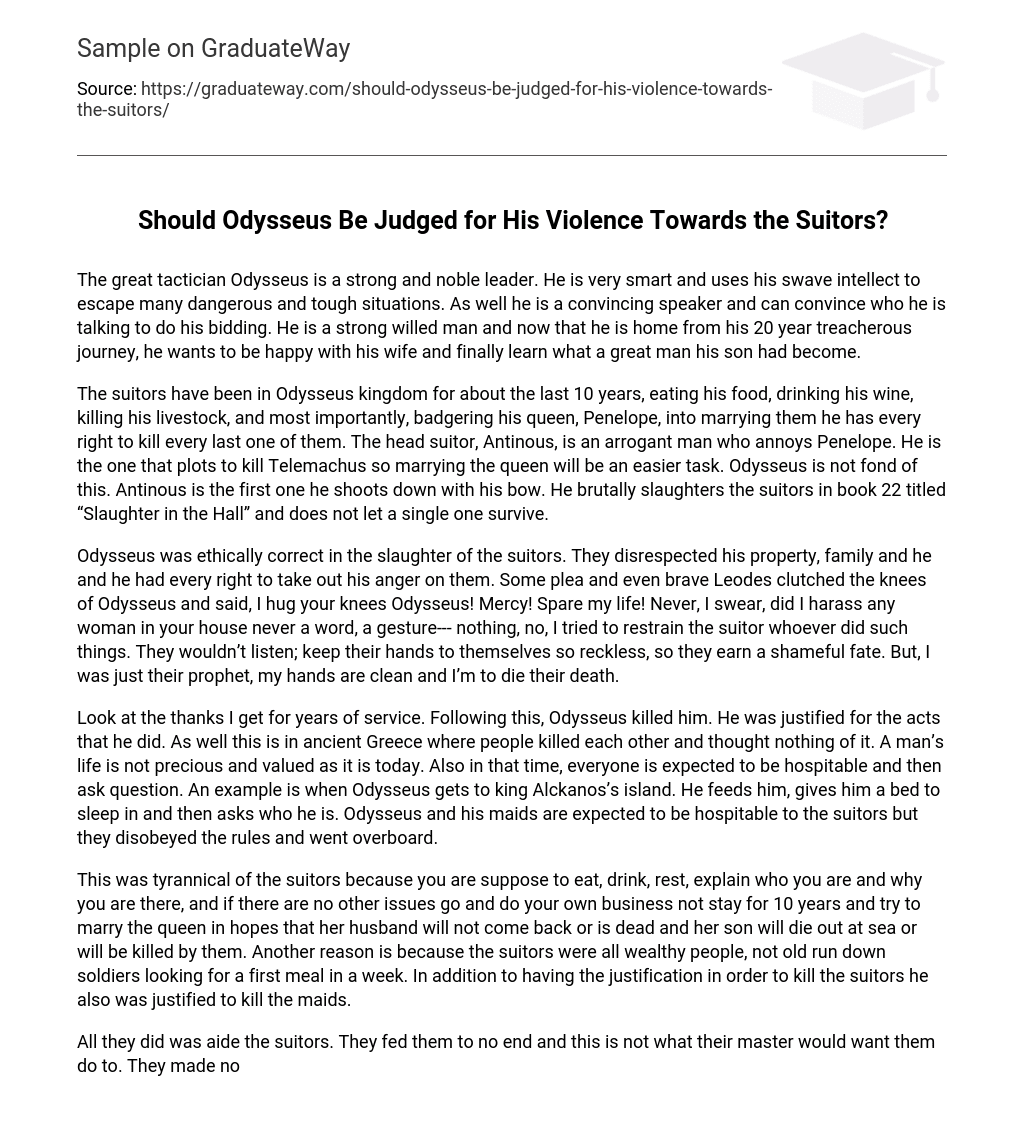Odysseus, the great tactician, is a strong and noble leader. He possesses exceptional intelligence, which he skillfully employs to navigate through perilous and challenging circumstances. Moreover, his eloquence enables him to persuade others to carry out his desires. With a determined demeanor, Odysseus has returned home after enduring a treacherous 20-year voyage. Now, he aspires to find happiness with his wife and discover the remarkable individual his son has become.
For about the past decade, the suitors have been residing in Odysseus’ kingdom. They have been consuming his food, drinking his wine, slaughtering his livestock, and pressuring his queen Penelope to marry them. Odysseus has every reason to eliminate all of them. The main suitor, Antinous, is a conceited person who annoys Penelope. He is the one plotting to kill Telemachus so that he can pursue marrying the queen. This does not please Odysseus. Antinous is the first target that Odysseus takes down using his bow. In book 22 titled “Slaughter in the Hall,” Odysseus ruthlessly kills all the suitors, making sure none of them survive.
Odysseus sought vengeance against the suitors due to their disrespect towards his property and family. Leodes, one of the suitors, even went as far as pleading with Odysseus, gripping onto his knees and imploring for mercy. Nonetheless, Odysseus remained resolute in his decision. Leodes professed innocence, affirming that he had never harmed any women within Odysseus’ household and had attempted to restrain the other suitors from their improper behavior. Despite his appeals, Leodes accepted his destiny, recognizing that he was merely a prophet who would perish alongside the suitors without having played a part in their transgressions.
Despite years of service, the gratitude I receive is disheartening. In the context of ancient Greece where killing was commonplace and considered inconsequential, Odysseus took his life, which was a justifiable action. The value placed on human life during that era was not as significant as it is today. Additionally, it was customary for individuals to extend hospitality to visitors before inquiring about their identity. This can be seen when Odysseus arrived on King Alckanos’s island and the king provided him with food and a place to rest before questioning his identity. However, Odysseus and his maids disregarded the rules of hospitality towards the suitors and exceeded acceptable limits.
The suitors, who were wealthy individuals, overstayed their welcome for a decade with the intention of marrying the queen and gaining control. This went against proper customs, which include eating, drinking, resting, explaining one’s presence and purpose before attending to personal matters. Given these circumstances, it can be argued that it was justified to kill both the suitors and the maids.
The maids provided unjust assistance to the suitors by continually feeding them, disregarding their master Odysseus’ wishes. They made no effort to expel the suitors from the household, which justified Odysseus’ choice to kill them. While Odysseus’ brutal killing of all the maids and suitors may have seemed severe, it was deserved. The maids treated the suitors as if they were royalty, dutifully fulfilling their every desire against their king’s expectations. Furthermore, the suitors displayed no respect for hospitality customs and conspired against Odysseus’ son while attempting to take his wife. Their detestable conduct led to their rightful destiny.





